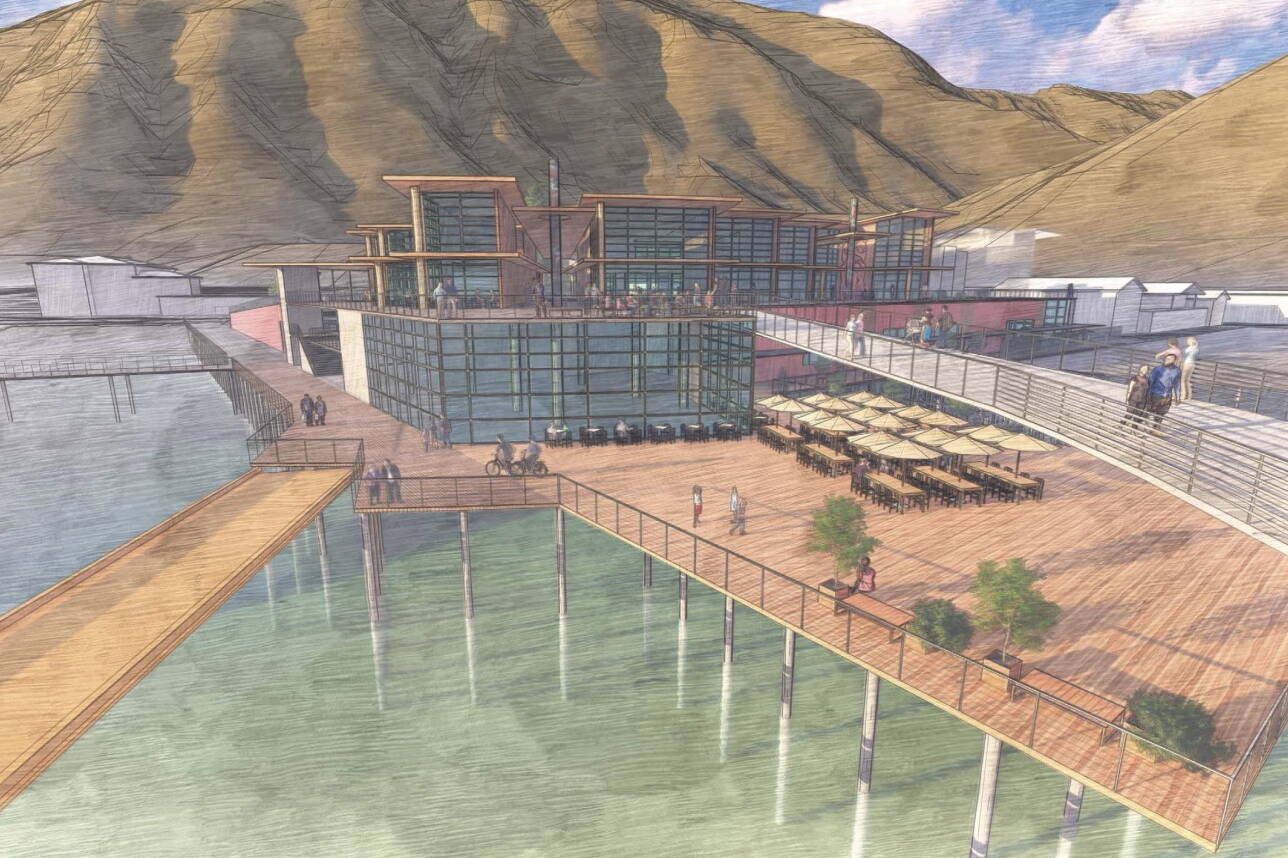A conditional permit for a major $150 million development project proposed on nearly three acres of Juneau’s downtown waterfront received approval Monday night by the City and Borough of Juneau Planning Commission in a 7-1 vote.
The approval follows the commission’s move in early July to approve another permit — subject to several conditions — for the construction of a floating steel cruise ship dock located downtown along Gastineau Channel off the intersection of Whittier Street and Egan Drive.
The two projects, proposed by Huna Totem Corp., are connected and a part of the Alaska Native corporation’s large vision for its downtown waterfront property. The corporation seeks to develop both a waterfront pier and cruise terminal — named the Aak’w Landing Project — after being donated the 2.9 acres of property worth $20 million by Norwegian Cruise Line in late August of 2022.
The commission-approved upland portion of the project proposes the development of year-round retail, restaurants, a park and underground vehicle parking, along with a culture and science center built in partnership with Sealaska Heritage Institute and Goldbelt Inc.
The dock portion of the project has been appealed by a Juneau resident and local cruise-limiting activist Karla Hart, which meant discussion of the dock at the meeting Tuesday night was banned by the commission and public commenters. The appeal will be heard by the Assembly at its Aug. 21 regular meeting. Hart cited inadequate public notice and environmental analysis in her appeal.
Despite both the proposed dock and upland development approval by the commission, before the project can fully move forward Huna Totem will need approval from the Assembly for a land deal to lease the city-owned tidelands the corporation plans to use. If that doesn’t happen it could stop the project from moving forward altogether. According to City Manager Rorie Watt, that decision won’t likely happen until after the October election.
The decision made at the meeting Tuesday evening followed nearly four hours of discussion and more than 20 comments from members of the public for and against the project. The inability to speak about the dock portion of the project proved difficult for both commission members and residents who wished to speak about both proposals.
Kirsha Hughes-Skanjis, a North Douglas resident, speaking on behalf of herself, said the center “as described sounds lovely.” But she said she took a larger issue with the development and its connection with the “unseen elephant” in the room, alluding to the dock’s approval which she said she was unaware happened at the meeting in early July.
“Overall I am very weary of the expansion of our tourism industry,” she said. “I appreciate what’s being done, but at this time I am extremely concerned about the project in the big picture.”
Multiple commenters shared similar concerns, along with citing pollution and increased impacts of tourism as reasons they were against the project.
Steve Krall, another resident, said he didn’t think tourism as an industry was the problem at hand, but the city’s lack of management, which led it to become too much for Juneau.
“We’ve neglected to manage it in a reasonable way,” he said.
Kerry Crocker, a resident and the president of the International Longshore and Warehouse Union — a labor union that primarily represents dock workers — spoke in favor of the project and said the jobs opportunities the project could bring, and its potential to alleviate some of the tourism traffic downtown, “will make a huge difference.”
“The additional work opportunity with this project is considerable for us and Huna Totem said they are likely to use our employer, which I am in favor of that,” he said.
Along with the people who commented at the meeting, Rosita Kaaháni Worl, president of Sealaska Heritage Institute, expressed support for the project, and its partnership in the culture and science center incorporated into the design, in a letter sent to the planning commission.
“This builds on the exciting national movement to integrate Indigenous knowledge and science and expands the goal of making Juneau the Northwest Coast Arts Capital,” she wrote. “After decades of the property essentially standing vacant, we strongly support the conditional use permit and development HTC and its partners are bringing forward. We are proud to be part of that team.”
McHugh Pierre, president and CEO of Goldbelt, shared similar excitement about the company’s affiliation with the project.
Huna Totem Corp. President and CEO Russel Dick told the Empire after the meeting he was happy to see the project receive approval by the commission and he remains confident it will be able to gain approval for the tidelands by the Assembly when the time comes. He pushed back at several comments made during the meeting that said the process was not adequately shared with the public.
“There’s a lot of work to be done, a lot more public engagement, and we’ve said it over and over the process doesn’t stop here,” he said. “We feel like this has followed the right process and then we’ll continue to follow the right process — nobody’s hiding anything and it’s a process that we want to engage with the community.”
• Contact reporter Clarise Larson at clarise.larson@juneauempire.com or (651)-528-1807.

